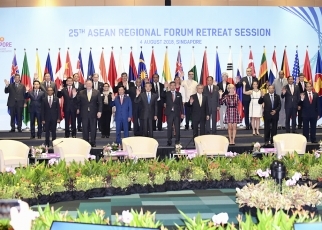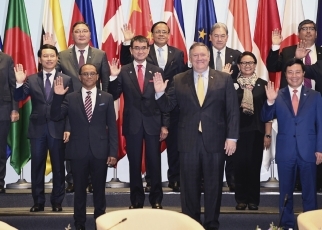ASEAN Regional Forum (ARF)
The 25th ASEAN Regional Forum (ARF) Ministerial Meeting
August 4, 2018



Foreign Minister Mr. Taro Kono attended the 25th ASEAN Regional Forum (ARF) Ministerial Meeting which was held in Singapore, on August 4 from 14:00 to 17:15 (local time). The overview of the meeting, focusing on Minister Kono's comments, whose comments are basically identical to the EAS meeting, but remarks are made to avoid duplication, is as follows.
1 ARF activities
Minister Kono stated that Japan highly values the confidence building facilitated by the ARF, and we will continue to contribute to the ARF process. He also expressed his respect to the effort of the ASEAN regional cooperation in developing a rules-based community sharing values and norms in diversity.
Many participants appreciated the ARF as an appropriate forum not only for confidence building among the participants but also for candid exchanges of opinions on non-traditional threats such as cyber, terrorism, refugees and climate change. With regard to ARF-ISM on ICTs Security, of which Japan, Malaysia and Singapore took initiative, the Terms of Reference (TOR) and Confidence-Building Measures (CBMs), including the ones proposed by Japan, were adopted.
Many participants appreciated the ARF as an appropriate forum not only for confidence building among the participants but also for candid exchanges of opinions on non-traditional threats such as cyber, terrorism, refugees and climate change. With regard to ARF-ISM on ICTs Security, of which Japan, Malaysia and Singapore took initiative, the Terms of Reference (TOR) and Confidence-Building Measures (CBMs), including the ones proposed by Japan, were adopted.
2 Exchange of views on regional and international issues
(1) Free and Open Indo-Pacific Strategy
Minister Kono stated that Japan is willing to work with all the ARF members to coordinate Japan's Free and Open Indo-Pacific Strategy with other concepts, saying that he would not reiterate the details of Japan's Strategy, which he spoke in the EAS meeting. He also stated that ASEAN, sitting in the middle of the Indian Ocean and the Pacific, plays the key role in promoting stability in the region. Japan will promote the ASEAN centrality and unity through its Free and Open Indo-Pacific Strategy.Some participants explained their views and concepts on the Indo-Pacific. Reaffirming the commonality of these views and concepts, they expressed their intention to continue discussing the way to deepen coordination among them.
(2) North Korea
Minister Kono stated that Japan considers the United States-DPRK Joint Statement as a step toward comprehensive resolution of outstanding issues, and strongly hopes that it will lead to North Korea's actions toward achieving the full implementation of the United Nations Security Council resolutions (UNSCRs). He also stated that Japan's position based on the Japan-DPRK Pyongyang Declaration has never changed, and as Japan has often stated, it will make earnest efforts to resolve outstanding issues between Japan and North Korea in order to normalize the relationship.Many countries stressed the importance of realizing complete denuclearization of North Korea and of continued full implementation of the relevant UNSCRs by the international community.
(3) South China Sea
After stating that he would refrain from repeating Japan's view since he has already spoken in the EAS meeting. Minister Kono stressed that the parties concerned need to resolve their conflict peacefuly and to pursue demilitarization of the region. He also stated that ARF also needs to deliver a strong message reflecting the basic principles that ASEAN has upheld.Almost all of the participants took up the South China Sea issue and referred to the importance of securing the freedom of navigation and overflight as well as peaceful resolution of conflicts in accordance with the international law including the United Nations Convention on the Law of the Sea (UNCLOS). There were also many participants which stressed the importance of non-militarization as well as self-restraint. Moreover, many participants referred to the necessity of an effective Code of Conduct (COC).
(4) Counter-terrorism
Minister Kono stated that Terrorism and violent extremism are the imminent challenges to the region. Japan gives priorities not only to traditional counter-terrorism measures but also to measures to prevent violent extremism (PVE) that address root causes of terrorism. He expressed that Japan will continue to assist capacity building in border control and mitigation of violent extremism in the region.Many countries expressed concerns about the proliferation of terrorism and violent extremism, and underscored the importance of confronting counter-terrorism and violent extremism through building society marked by tolerance and respect to diversity.
(5) Rakhine State
Minister Kono stated that peace and stability of Rakhine State is a regional concern. He expressed that Japan welcomes the announcement of the members of the Independent Commission of Enquiry and strongly expects that the commission will conduct a credible investigation in a transparent manner. He also stated that Japan will continue to provide the utmost support to Myanmar's efforts, in collaboration with ASEAN.Many participants expressed concerns about the situation in Rakhine State and emphasized the importance of the support by the whole region.


